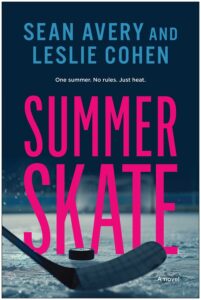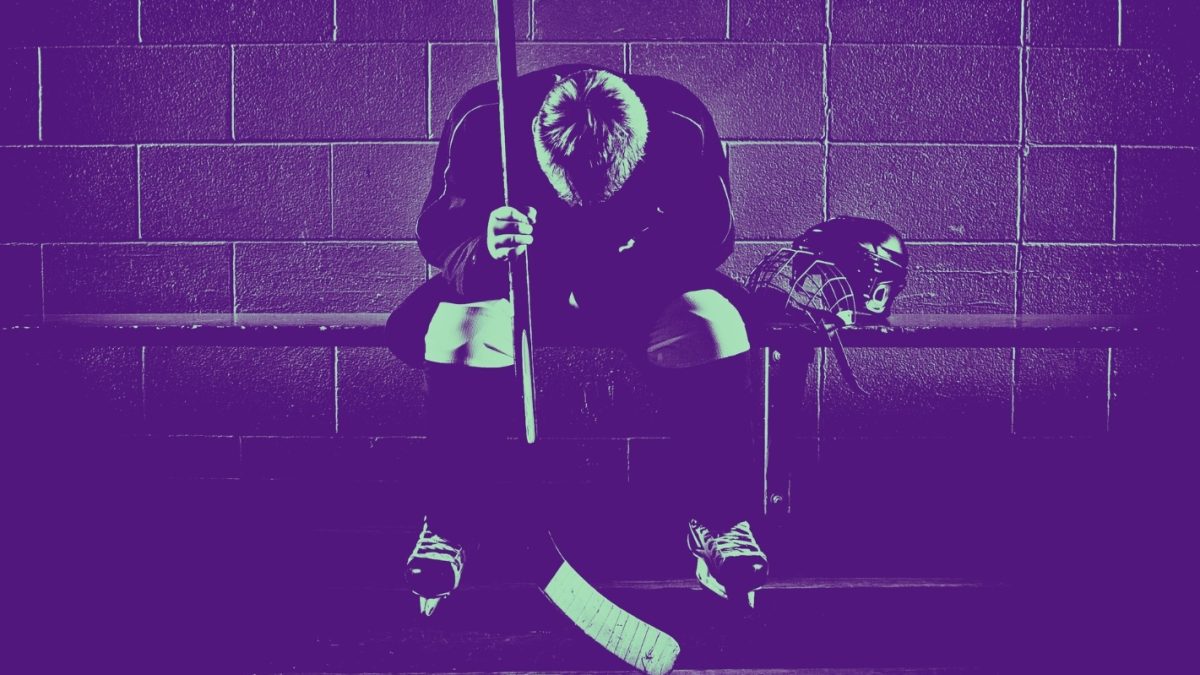Long before writing a hockey romance novel, long before I’d written any novel of any kind, I was just a girl, sitting on my parents’ couch, watching a hockey game. I remember my father walked into the room one day and said: “at this level, there is very little difference in skill between these two teams. They’re all skilled. It’s just about who wants it more.”
I sat there, silently, but every alarm bell went off in my brain. You mean sheer will to win is a factor? But I didn’t respond. It’s important not to let your parents know you’re listening to them.
I never played hockey, but I did play tennis. From age nine to eighteen, I competed in tournaments and carted around a red Wilson tennis bag like an appendage. My mother would always tell me that I came off the court looking like hell, like I’d been through a war, red-cheeked and covered in sweat, dirt and clay. I considered this high praise. The war was everything to me.
My father was a big New York Islanders fan, so when I wasn’t on the court, I was headed to Nassau Coliseum. Another battlefield. If the Islanders won, my father would gleefully beep his horn on the way out of the Coliseum parking lot and listen to post-game radio the whole ride home. If they lost, the ride was less jovial. Silence. The car rides after my tennis matches were the same way. I knew the feeling of victory—upbeat, alive with chatter. And the dull disappointment of loss—silence.
The car rides after my tennis matches were the same way. I knew the feeling of victory—upbeat, alive with chatter. And the dull disappointment of loss—silence.
Before my matches, my father would tell me to “stay in my shoes,” which meant to literally not jump when I hit my shots, but also—stay focused and grounded, in the game. He would say not to come home without two points, which, in hockey, means you’d better bring home the win.
And I won. A lot. I was not the biggest or the strongest player—an opponent once compared my legs to toothpicks—but I had a tremendous will to win, and that resulted in the significant accumulation of hardware. Trophies, trophies, trophies, all standing tall on the bookshelf above my desk. A constant reminder that persistence, determination, and perseverance are all well and good, but you’ve got to have some metal to show for it.
I used the grit that I had as a tennis player to make myself into a novelist, to overcome all the rejection and obstacles along the way. I watched as my younger-gritty-competitive-tennis-player-self faded away, and my older-equally gritty-equally competitive-novelist-self took over. It was a seamless passing of the baton. Without my sports background, maybe I would have said you’re right when somebody told me that writing was a hobby, not a career. Maybe I would have read hundreds of rejection letters from agents and editors and said: you know what? I should pack it in. But no. I chose to stay in my shoes.
Muscle memory often takes over. I used to pump my fist and yell come on when I won a hard-fought point on the court, a practice not uncommon to tennis players. I still fight the urge to react the same way, as an adult. Whenever I experience victory as a writer, my fingers immediately start to curl into a fist.
Whenever I experience victory as a writer, my fingers immediately start to curl into a fist.
In Summer Skate, the hockey romance novel I wrote alongside former New York Ranger Sean Avery, a novelist, Jessica, and a professional athlete, Carter, circle each other in a forbidden, lust-drenched game of chicken. Who will break?
But before anybody can break, they needed to find common ground. At first, this felt like a daunting task. They have so many differences: age, background, education. He is in awe of her upbringing in New York. She accuses him of being from “a frozen lake somewhere.” But I knew they had one significant thing in common: a tremendous will to win.
In truth, a novelist is uniquely qualified to write sports fiction. Hockey players are tough. But novelists are tougher. You express your innermost thoughts, bare your soul, expose your weaknesses, pick at your vulnerabilities, and then some creative executive, agent, editor, or stranger on the Internet tells you that you have no sense of dramatic tension, no sense of comedic tension either, while we’re at it, and that you’ll never make it in this business, that they’d rather claw out their own eyeballs than read another word of your drivel. Ohhh, you think a punch to the face is worse? Get real. They’re on skates! There’s no… leverage.
The small moments of frustration and tension are etched into the stones, but all you can see now is the castle.
In Summer Skate, Carter and Jessica talk about the importance of delusion, to be successful at sports, writing, anything. The tennis centers where I grew up playing were not glamorous. They were fairly dilapidated, actually. There was always at least one letter missing from the words Racquet Club on the outside of the building. But if you had told me I wasn’t playing in the U.S. Open, I would not have believed you. Sean Avery is one of the most delusional people I’ve ever met, and I mean that as a compliment.
From playing tennis and watching hockey, I developed a love of the game, an appreciation for the battle. And thank god for that, because while writing Summer Skate, Sean and I were awash in battles. We fought constantly. Sean would refer to my tennis career as “amateurish” and then try to convince me that “amateurish” didn’t mean inept. It meant, simply, to engage in a sport but not be paid, to be unprofessional. He was using the non-insulting version of the word. I then said that I would have to be of “amateurish” intelligence to accept that argument. I went to sleep fuming, then woke up and started working on the next chapter.
The road to victory is always paved with moments exactly like this. Hopefully, by the end of the road, you have built a beautiful book. The small moments of frustration and tension are etched into the stones, but all you can see now is the castle.
__________________________________

Summer Skate by Sean Avery and Leslie Cohen is available from BenBella Books, a division of Simon and Schuster.
